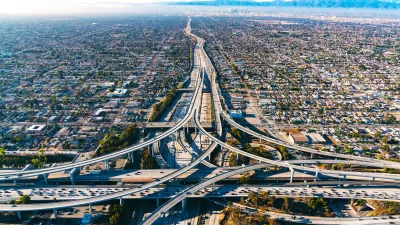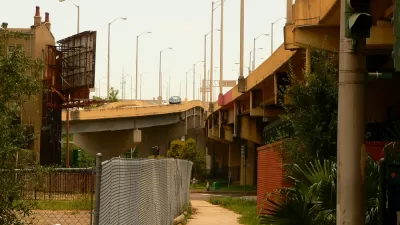With the new administration placing racial justice and equity at the forefront of transportation policy, will America finally reckon with the legacy of its freeways?

In a piece for Common Edge, William Fulton describes a scene that's all too common in many American cities: a dense, walkable downtown, brimming with diverse uses and businesses, sliced through by a massive freeway overpass. "In almost every urban location I have ever lived, a midcentury transportation scar stretches across the landscape and makes navigation difficult for pedestrians," writes Fulton. These scars reveal the inequities of top-down policies whose effects continue to reverberate throughout communities, even as city leaders attempt to redress past injustices and rectify their negative impacts.
"The complicated truth is that even as these freeways destroyed and divided neighborhoods, they also provided regional access to downtowns and other central-city locations that were struggling in the postwar suburban era. And in recent years they may have helped the rebirth of urban neighborhoods by giving city residents easy driving access to suburban job centers and also giving shoppers easy access to historic Main Streets."
The current "Big Rethink" around highways is an opportunity to challenge assumptions and find creative ways to repair the damage without sacrificing mobility. Around the country, cities are looking at ways to replace elevated freeways with boulevards, build freeway caps (which create valuable public and private real estate, albeit still near a major source of air pollution), and reduce the number of on and off-ramps to increase land available for other uses while maintaining the flow of traffic. "Healing urban scars and reclaiming the urban environment comes with a steep price tag—and doesn’t always expand freeway capacity, which is usually the primary driver of state and federal transportation funding," Fulton says, but successful examples like Dallas's Klyde Warren Park and San Francisco's Embarcadero show that alternatives are possible.
FULL STORY: Repairing the Urban Fabric Ruined by Highways

Planetizen Federal Action Tracker
A weekly monitor of how Trump’s orders and actions are impacting planners and planning in America.

Map: Where Senate Republicans Want to Sell Your Public Lands
For public land advocates, the Senate Republicans’ proposal to sell millions of acres of public land in the West is “the biggest fight of their careers.”

Restaurant Patios Were a Pandemic Win — Why Were They so Hard to Keep?
Social distancing requirements and changes in travel patterns prompted cities to pilot new uses for street and sidewalk space. Then it got complicated.

Albuquerque Route 66 Motels Become Affordable Housing
A $4 million city fund is incentivizing developers to breathe new life into derelict midcentury motels.

DC Area County Eliminates Bus Fares
Montgomery County joins a growing trend of making transit free.

Platform Pilsner: Vancouver Transit Agency Releases... a Beer?
TransLink will receive a portion of every sale of the four-pack.
Urban Design for Planners 1: Software Tools
This six-course series explores essential urban design concepts using open source software and equips planners with the tools they need to participate fully in the urban design process.
Planning for Universal Design
Learn the tools for implementing Universal Design in planning regulations.
Heyer Gruel & Associates PA
JM Goldson LLC
Custer County Colorado
City of Camden Redevelopment Agency
City of Astoria
Transportation Research & Education Center (TREC) at Portland State University
Camden Redevelopment Agency
City of Claremont
Municipality of Princeton (NJ)





























